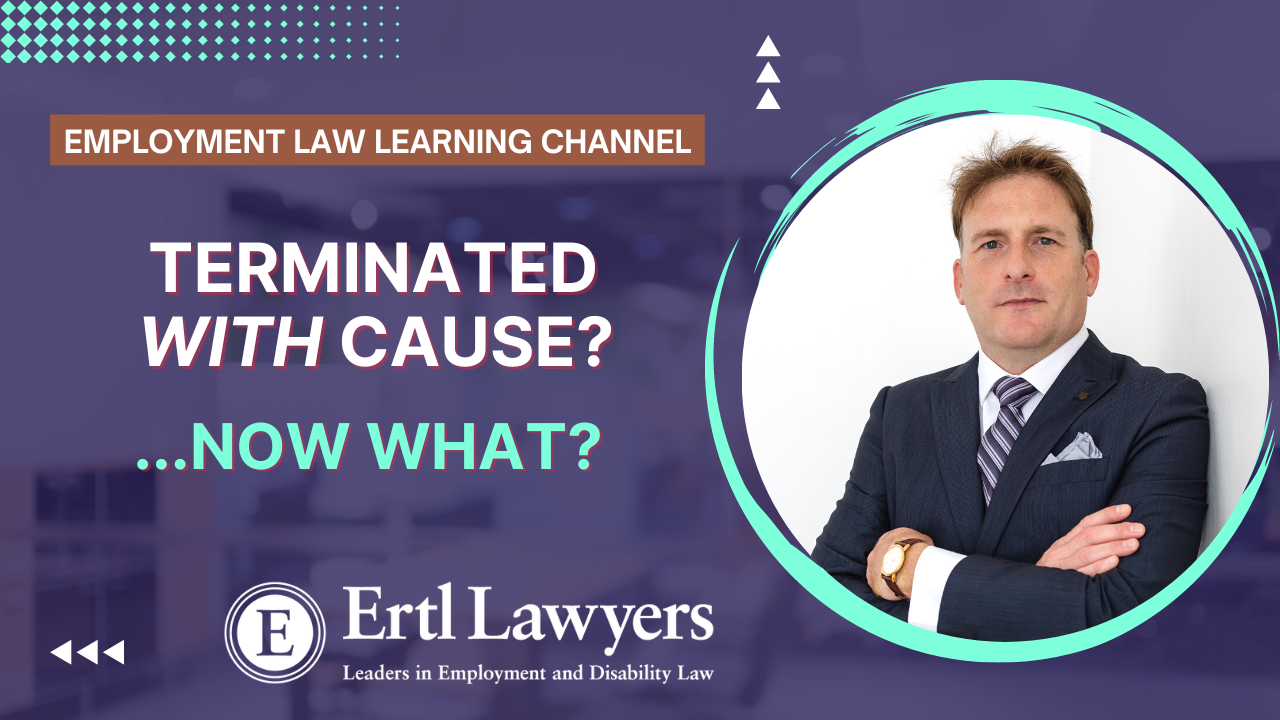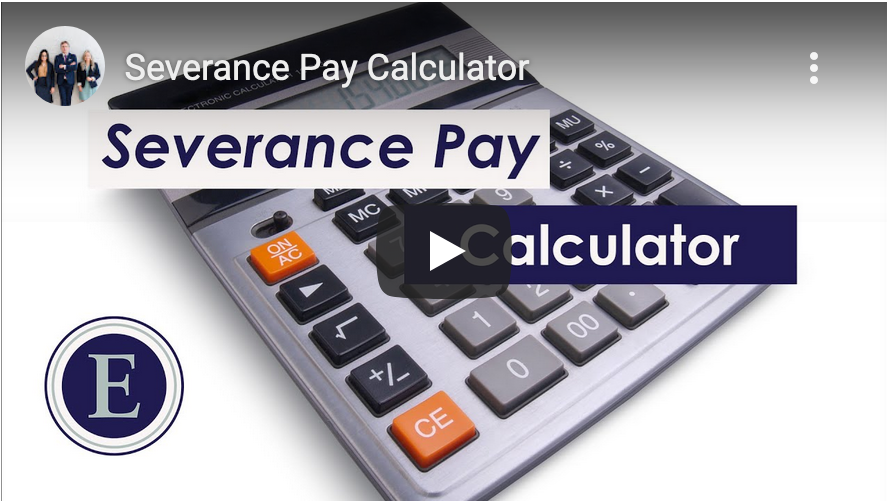Terminated With Cause
Have you been terminated with cause or with just cause? What does that mean?
It means the employer believes you’ve engaged in conduct that justifies terminating you without notice or severance pay. The employer believes the employment relationship has been permanently damaged and no other form of discipline was appropriate.
Did my employer have just cause to terminate me?
It can be difficult for an employer to justify terminating with cause. The misconduct must be severe or have happened on previous occasions (for which you had been warned).
If you have been terminated with cause, don’t panic. Each case must be examined objectively and on its own facts. Decisions in other cases, therefore, may have little value.
Grounds for being terminated with just cause may include:
• insubordination
• conflict of interest
• gross incompetence
• habitual neglect of duty
• unauthorized absence
• theft and fraud
• dishonesty
• lying to employer during investigation
• breach of employer’s policy
• assaulting co-workers
The “test” for cause or just cause
The test is whether the employee’s misconduct gave rise to an irreparable breakdown in the employment relationship.
Just cause for dismissal will exist where any or all of these exist:
- the misconduct violates an essential condition of the employment contract.
- breaches the faith inherent to the work relationship.
- is fundamentally or directly inconsistent with the employee’s obligations to their employer.
Therefore, it is crucial that you consult with an experienced employment lawyer if you have been terminated with cause.
Is there anything that can help me if I have been terminated with cause?
Yes. Because determining whether you were properly terminated with cause depends on a contextual approach, the following factors may help your case:
• A “just cause” dismissal is the “capital punishment” of employment law and, as a result, the onus is on the employer to show misconduct of the most serious kind.
• A single instance of misconduct is often not enough to warrant dismissal for cause.
• Dismissal for cause for performance-related issues generally requires that the employer have given the employee a warning and a reasonable opportunity to correct the deficiency before dismissal.
• If an employer does not act promptly in dismissing an employee (for misconduct the employer knows about), the employer is said to have condoned the behaviour. The employer will not be able rely on that behaviour to summarily dismiss the employee in the future.
• The longer an employee has been with the employer, the harder it is for the employer to justify dismissing them for cause.
• Where an employer does not stick to its own disciplinary policies (either in the handling of your matter or with other incidents involving other employees) it is often fatal to the employer’s case.
• A faulty investigation (i.e. no fair opportunity for you to tell your side of the story) can ruin an employer’s case.
Important: These are just a few of the things that can help your case.
Can my employer terminate me without cause and then later say that it had cause?
If an employer terminates you without cause and then later becomes aware of misconduct (that it was unaware of at the time of your termination), it can rely on the newly discovered misconduct – and claim that it terminated with cause. This is called after-acquired cause.
Unfortunately, after-acquired cause is often raised by employers to deter a former employee from pursuing their legal entitlements. These allegations may arise after the employee confronts the employer about an inadequate severance offer.
Important: Judges will pay extra attention to an employer who alleges cause after the fact. Further, a failed after-acquired cause argument may attract a higher notice period for an employee.
I have been terminated “with cause”. Am I entitled to anything under the Employment Standards Act?
Under Ontario’s Employment Standards Act, there are some exceptions to an employer’s obligation to provide notice. One of those is where the employee is guilty of “wilful misconduct, disobedience or wilful neglect of duty that is not trivial and has not been condoned by the employer”.
This is similar to the concept of “just cause” at common law which would disentitle the employee to reasonable notice. At common law, “just cause” for dismissal can be found for various forms of misconduct, including misconduct that is less than “wilful”. Therefore, Employment Standards Act standard has been interpreted as a higher standard than the “just cause” standard employed under the common law.
What does all of this mean? It means that, even if you were dismissed with cause by your employer, you may still be entitled to compensation under the Employment Standards Act.
Caution: It is not recommended that you make a complaint under the Employment Standards Act until you consult with a lawyer. If you make an Employment Standards complaint with the Ministry of Labour (with respect to your entitlements upon termination) you will be barred from pursuing a wrongful dismissal claim unless your complaint is withdrawn within two weeks. Further, with some limited exceptions, the maximum you can obtain through such a complaint is $10,000.
I have been terminated with cause. Am I entitled to Employment Insurance benefits?
If you were terminated with cause, your entitlement to Employment Insurance benefits is determined by the Employment Insurance Act and the discretion of an employment insurance officer, board, or umpire.
The Employment Insurance Act uses the standard of “misconduct”. Precisely what type of “misconduct” would disqualify an employee from receiving benefits is not clear, but many employees who are terminated by their employers for just cause are still eligible for Employment Insurance benefits.
In our view, this is probably due to the fact that many employers do not tend to respond to questions asked by employment insurance officers. First, there is no legal obligation to do so. Second, an employer has no economic interest in whether the employee receives Employment Insurance benefits.
The Employment Insurance Act basically states that in the absence of any evidence from the employer, they are to give the benefit of the doubt to the employee.
I’m worried about what my employer might say to prospective employers.
It is possible that your former employer might say something negative about you, but many employers do not want to risk further potential liability. In addition, it is usually in the employer’s interests that you find work as quickly as possible – so that any potential damages are reduced.
Important: Having said this, there are other potential solutions to this dilemma. It is important to speak with an employment lawyer about this.
After 17 years of loyal service, my employer terminated me for cause for breach of a policy. David proved that the policy didn’t even exist, and that the employer simply wanted to avoid paying me severance. I would have gone bankrupt without Ertl Lawyers.
– B.P., Maintenance Supervisor, Oakville
Terminated With Cause?
If you were terminated without cause, you can call us for a free consultation.
We will discuss the facts of your case with you, whether the employer has enough evidence to establish cause, and answer any other questions you may have.
Our help can make all the difference!
Related Blogs
Pay Cut Laws: Can My Employer Reduce My Wages in Ontario?
The answer is yes; an employer can reduce your wages in Ontario, as they can in other Canadian provinces. Employers are allowed to make minor changes to your employment, including small reductions in your pay (with exceptions). They can also make significant changes...
The Right to Disconnect in Canada: Everything You Need to Know
On December 2, 2021, the Ontario government amended the Employment Standards Act, 2000, (ESA), when it passed Bill 27, known as the Working for Workers Act, 2021. The amendment made headlines primarily because it was purportedly giving Ontario workers the “right to...
What is a Performance Improvement Plan & What Does it Entail?
A performance improvement plan (PIP) can be a legitimate management tool used to help employees shore up deficiencies in their speed or quality of work, or to address any behaviour-related concerns. It can also be used as an excuse to fire an employee for cause when...








